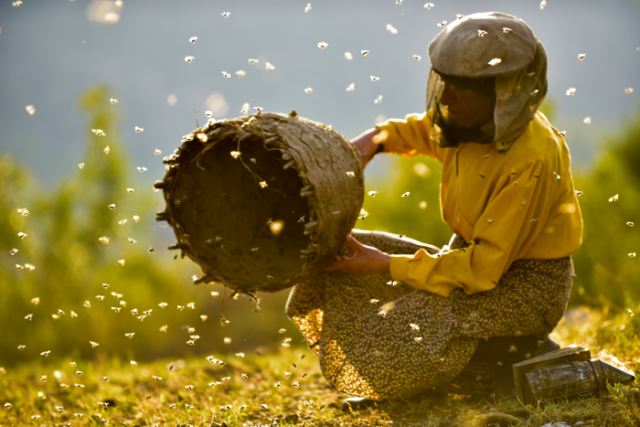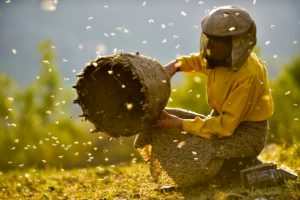CinéDOC-Tbilisi Opens with 'Honeyland' a Blowing Masterpiece
REVIEW
On Wednesday, the CinéDOC-Tbilisi International Documentary Film Festival opened with “Honeyland”, a documentary by Ljubomir Stefanov and Tamara Kotevska. The festival organizers chose a film that already won several awards in documentary competitions, including three prizes at the Sundance Film Festival and the Grand Jury Prize at the Sarasota Film Festival, and for good reason.
The documentary was filmed during three years in a deserted Macedonian village and follows the life of Hatidze, a woman of around 50 years old who lives with her sick mother. She lives in the middle of nowhere, with no running water and no electricity. She raises bee colonies and collects honey with her bare hands before selling it at the market. She has a very special connection to the bees and sings them mystic chants. Her calm life is interrupted one day when an itinerant family of seven children with 150 cows settles on the land next to her house. Where this event brings her a lively and social life at the beginning, it ultimately devastates her way of life and her bee colonies. Indeed, the father of the family also decides to make money out of bees and to produce honey. However, he doesn’t follow Hatidze’s advice and collects too much honey at once, leaving the bees with no honey to eat and urging them to attack Hatidze’s own bees. Her relationship with the family deteriorates and the family ultimately leaves the village, leaving Hatidze with no source of income.
The documentary is part of the festival category “Our planet and us”. It shows Hatidze’s traditional and natural way of collecting honey and living in harmony with her bees. She climbs the hills to go see her bee colonies nestled in the rocks, she does not use gloves to handle the bees and yet never gets stung. She only sells pure honey and her customers all love it. It also demonstrates the need to respect biodiversity and to give nature as much as we can take from it. If we do not respect this rule, we take the risk of forever harming our rich environment, just like Hussein, the father of the family does. Not only does he end up killing all Hatidze’s bees to make more money himself, but he also sees more than half his livestock dying because of lack of care.
However, what mostly comes out of this documentary is the way in which human relationships and feelings are depicted. Hatidze has a very special relation with her mother. Her mother is paralyzed, blind in one eye and half deaf, she never moves from her bed and yet the two women share a beautiful complicity. Hatidze takes care of her mother with great tenderness, she even manages to laugh at the situation during the hardest moments. The mother also displays a great sense of humor and wisdom through the few words she pronounces. Her mother often tells Hatidze to leave her alone and go enjoy her life, but Hatidze will stay with her mum until the end.
The arrival of the itinerant family also brings its fair share of emotions. The 7 children are restless and out of control and yet Hatizde manages to teach them a lot, play with them and is very caring with them. The life of the family is topsy-turvy and the public directly assists in the hard and crude life of farmers dealing with their cows and trying to survive. They all get into conflicts and fights but ultimately support each other. Even the violence that the mother uses against her children is depicted in a funny way, she yells at her kids and treats them bluntly but also deeply loves them.
Overall, Hatidze’s serenity contrasts with the family’s disorders and creates a very poetic picture, the moments spent together are joyful and make us smile. The camera catches incredible images of nature landscapes as well as the finest human situations. Hatidze’s relationship with her mother is extremely touching. Hatidze herself is fascinating, she gives off a mysterious charm and sympathy all over her journey. Her generosity and affection withstand everything. While assisting to this story, the public will neither hold their tears nor laughs back. The camera just makes people face the gentle, harsh, and epic reality of life in the most beautiful way.
The documentary will be screened one last time on the 11th of May at Amirani Cinema.
More information is available here: http://www.cinedoc-tbilisi.com/?p=7768
By Gabrielle Colchen
Photo Source: cinédoc-tbilisi.com











